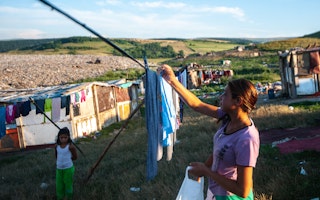
Anzhelika Bielova: Women Rising
Women’s Economic Empowerment
In 2019, Anzhelika Bielova, a well-known Roma activist from Zaporizhzhya, Ukraine, was stabbed and nearly killed by a man with a history of violence against women. “I had surgery for almost nine hours,” she says. “I was silent for a long time. I had deep trauma.” When she recovered her voice, she began telling her story and calling the attack an attempted femicide. Bielova founded an organization called Voice of Romni to fight against gender-based violence, a formerly taboo subject in the Roma community. “Roma women often do not recognize gender-based violence. Men don’t understand it, and if they don’t understand what it is, nothing changes at home.”
Bielova’s team created a project on the economical empowerment of Roma women. Then the Russians invaded, the bombs began falling, and Bielova had to flee with her daughter, first to Budapest, then back to Ukraine.
The team set up social programs for internally displaced persons and Roma community in the west in Uzhgorod and Bielova and quickly went to work organizing humanitarian aid—cash assistance, food kits, kids’ kits, hygiene kits, wood for heating and cooking, and power banks in eastern Ukraine. They also sent out teams to repair destroyed homes. “It’s important a family has even just one warm room to survive the winter,” says Bielova.
Today she has 50 staff and four offices—operating headquarters in Uzhgorod and on the front lines of Kharkiv, Kryvyi Rih, and Zaporizhzhia. Their approach is comprehensive: economic empowerment, psychological care, and education. Voice of Romni has helped almost 110,000 people through different types of aid and services.

Bielova tells the story of Ruzanna, a Roma woman who fled the Russian-occupied territory of Donetsk to Kryvyi Rih. Bielova’s team taught her nail artistry and provided her a starter kit and a business grant, and she opened a small nail studio. “Now she doesn’t need us anymore because we provided her with the tools to take care of her family.” Rosanna is just one of 500 women Voice of Romni has assisted with learning a profession, promoting their businesses online, and learning technical language and skills.
Bielova has also opened two beauty co-working spaces in Zaporizhzhia and Kryvyi Rih offering rent-free workstations and a children’s corner with babysitters for both the workers and their clients. “Before the war, this was my social entrepreneurship dream,” says Bielova. “I’m a mom,” says Bielova. “It matters to have somewhere safe for your child while you work.”
“I’m personally so proud of the recovery camp we are providing for Roma women and children from the frontlines, from occupied territories, for people who lost family or relatives.”
— Anzhelika Bielova
Beyond physical deprivation, there is also the emotional and psychological toll of living in sustained poverty, displacement, and war, especially on children. Voice of Romni is trying to fill in the gaps with community education spaces, teaching English, math, physics, biology, and information technology, and providing psychological support. “The children are coming with PTSD symptoms—nightmares, sleeplessness, social adaptation issues—and the need is overwhelming,” she says.
“I’m personally so proud of the recovery camp we are providing for Roma women and children from the frontlines, from occupied territories, for people who lost family or relatives,” says Bielova. Situated in a hotel in the Carpathian Mountains—rooms, meals, transportation, and everything else paid for by Voice of Romni—her team runs art therapy, psychological consultations, aqua aerobics, a wellness spa, and, most important, six days of quiet. “For people from the frontlines, sleeping through the night is a dream, a fairy tale,” she says.

Finally, she’s also training smaller Roma NGOs to fundraise, meet donors, and gain visibility. “The Roma community is often overlooked within the humanitarian response and by international organizations,” she says. “Our job is to make the Roma community more visible” and to tear down the wall between Roma NGOs, UN structures, and NGOs worldwide. Recently Bielova was in New York City with four other Roma women from Ukraine, fundraising and working jointly with the Ukrainian women’s movement.
“I am lucky,” says Bielova, “I grew up in a family that valued education. My grandmother was an engineer and worked until 74. She helped many Roma with documents and land issues throughout her life. She’s always been an example for me of how to be a good mom and wife but also a leader and businesswoman.”
Elizabeth Rubin is an award-winning journalist who has spent over two decades reporting from conflict zones across the globe, from Afghanistan and Chechnya to the Balkans and the Middle East. Her work has appeared in The New York Times Magazine, The New Yorker, The Atlantic, and other leading publications.









